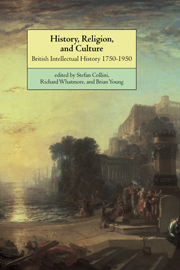Book contents
- Frontmatter
- Contents
- Preface
- General introduction
- Presentation of History, Religion, and Culture
- Part I
- 1 Historical distance and the historiography of eighteenth-century Britain
- 2 Gibbon and the primitive church
- 3 Gibbon's religious characters
- Part II
- Part III
- List of contributors
- Acknowledgements
- Index
1 - Historical distance and the historiography of eighteenth-century Britain
Published online by Cambridge University Press: 03 December 2009
- Frontmatter
- Contents
- Preface
- General introduction
- Presentation of History, Religion, and Culture
- Part I
- 1 Historical distance and the historiography of eighteenth-century Britain
- 2 Gibbon and the primitive church
- 3 Gibbon's religious characters
- Part II
- Part III
- List of contributors
- Acknowledgements
- Index
Summary
In his essay ‘Of Tragedy’ David Hume offers a striking observation on Clarendon's History of the Rebellion. As Clarendon approaches the execution of King Charles, Hume writes, he
supposes, that his narration must then become infinitely disagreeable; and he hurries over the king's death, without giving us one circumstance of it. He considers it as too horrid a scene to be contemplated with any satisfaction, or even without the utmost pain and aversion. He himself, as well as the readers of that age, were too deeply concerned in the events, and felt a pain from subjects, which an historian and a reader of another age would regard as the most pathetic and most interesting, and, by consequence, the most agreeable.
Hume's sympathetic understanding of Clarendon's reticence, combined with the clear sense that the spectacle that had been most painful to an earlier generation had become most interesting to his own, highlights the issue I want to address in this essay: the question of historical distance, both as a general problem for historiographical narrative and as a specific issue in the historical writing of Hume's century. Hume clearly accepts the fact that both Clarendon and his audience found themselves in a kind of proximity to the regicide that ruled out many potential representations of that event, especially (we surmise) the kind of detailed, pathetic treatment that Hume himself would later offer his own readers in the History of England. Implicit, then, in his remarks, is an understanding that historical distance is a significant variable in historical accounts, affecting both the historian and his audience (‘an historian and a reader of another age’).
- Type
- Chapter
- Information
- History, Religion, and CultureBritish Intellectual History 1750–1950, pp. 31 - 47Publisher: Cambridge University PressPrint publication year: 2000
- 2
- Cited by



